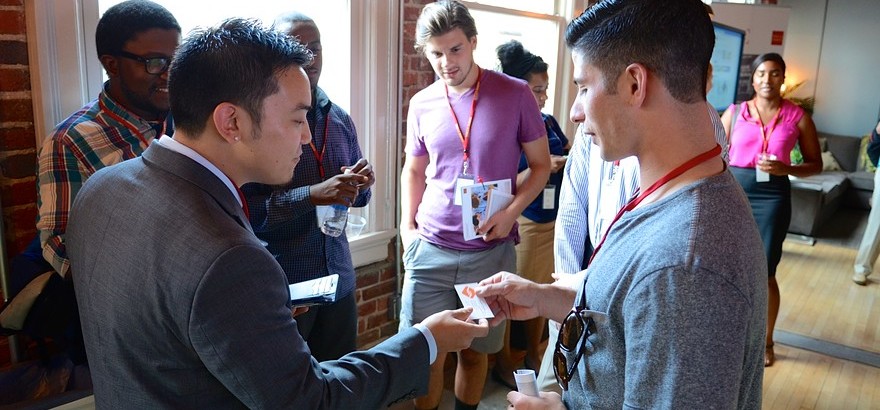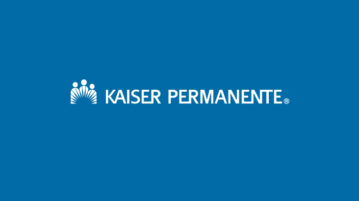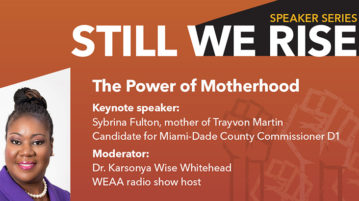By Jillian Berman
“I want to be the next Uber,” Tim Hedberg declared with little irony last week. The 26-year-old stood among dozens of other 20-somethings navigating between plates of caprese and Mediterranean chicken sliders, jugs of enhanced lemonade and small placards asking “How would you explain your idea to a kindergartner?”
Hedberg is the chief marketing officer of a company a kindergartner might not quite understand, a so-called “sharing economy” app called Klink that partners with local businesses to deliver alcohol to your door. He’d ventured to this loft in downtown filled mainly with other 20-somethings taking part in “Millennial Week” in Washington, D.C., “to get more plugged into the entrepreneurial scene.” The minimally furnished room, outfitted with wood floors and small lights hanging from the ceiling, was playing host to a “startup lounge,” featuring Wells Fargo WFC, +2.12% staffers (and logos) offering advice for young, aspiring entrepreneurs about how to write a business plan, raise capital and other necessary steps to get a business off the ground.
The startup lounge was just one of several events held in the nation’s capital as part of Millennial Week—a seven-day pep rally of sorts for today’s 18- to 34-year-olds. Hedberg’s unbridled optimism was typical of the confab’s tone.
Throughout the week, the organizers say, 4,200 young professionals, Capitol Hill interns and entrepreneurs popped in to panels on topics like politics and building capital for your business, schmoozed, built code and even practiced yoga—with about half a dozen sponsors courting them in the wings. The conference is meant to serve as a “weeklong celebration” of the generation, Millennial Week founder Natalie Moss, 34, said in an interview last month and it’s grown in popularity since last year’s inaugural event, which drew about 3,000 people.
This year’s events were certainly festive, particularly when juxtaposed with the realities that many young people face. Despite record levels of student loan debt, a general climate of youth underemployment and a constant barrage of headlines about how millennials are terrible to work with, participants and speakers were bullish about today’s young people.
And perhaps they should be. The constant hand-wringing over 20-somethings’ supposed lazy attitudes and their much-documented obsession with social media belies the fact that companies are fawning all over them by designing new candy flavors and office spaces in hopes of luring millennials’ money and talent.
“It’s just a great position that you’re in because everyone is recognizing that you’re the future,” Bernard Tyson, the CEO of Kaiser Permanente, the week’s main sponsor, told the crowd during the event’s keynote speech. Tyson pandered to the 20- and 30-somethings, playing his favorite hip-hop songs from his cellphone and sharing stories of how young employees taught his executive team about selfies and how to work more efficiently.
“They have the drive that I had when I was coming up,” Tyson said, vehemently denying the conventional wisdom that today’s young workers act entitled. “They’re not looking for a handout; they’re looking to make a contribution.”
Perhaps unsurprisingly, the millennials at the event agreed with this perception of themselves. Moss told the crowd she came up with the idea for Millennial Week a few years ago because “I just really wanted to create something that mattered.” In a previous life, the 34-year-old molecular biologist worked in a lab researching ovarian cancer.
Hedberg, whose day job is working for an educational nonprofit, even sees a higher purpose in his alcohol home-delivery service: “I get to actually make people’s lives better,” Hedberg said. “That excites me.”
Though many acknowledged negative generational stereotypes with some even embracing them—one panelist at an event on how to lure capital to your startup quipped, “we are by nature confident and at times overconfident”—the overall idealism seemed to be infectious.
“I love coming to these types of events because the stories are inspiring, but also driving,” said Monique Smaby, 26, during a break at Saturday’s “Unconference,” an event that is actually similar to a regular conference but claims to be driven largely by audience interests.
Smaby works at a nonprofit during the day and runs a business selling wedding and baby shower decorations online as a “side hustle.” She said she was particularly impressed with Greg Vetter, the chief executive officer of Essex, Md.-based Tessemae’s. Vetter spoke on a panel earlier in the week about how he turned his mom’s homemade salad dressing into a condiment empire that sells at Whole Foods WFM, -0.20% Costco COST, -0.39% and other stores. “Something happened in their kitchen that is now a national brand,” Smaby said.
Brandon Wood, 23, said he was similarly awed by his fellow youngs, noting that it’s “just awesome” to see so many members of a generation who graduated high school during the recession still going out and starting businesses. “I’m pretty pumped that there’s an event focused on people doing this in my generation,” Wood said, standing next to a wall at the startup lounge covered with sticky notes describing attendees’ various business ideas—the kind of ideas wall you might expect find at the offices of Facebook.
The environment was so cheerful that only a few cringed when asked by MarketWatch about their thoughts on the label millennial, despite the fact that 66 % of 18- 35-year-olds say the word doesn’t accurately describe them. “It’s awesome, I do like it,” said Akber Khan, who works at an IT company during the day and runs a health care app, Karavive, with his co-founders on the side.
Khan, 27, said Washington is a particularly exciting place to be a young entrepreneur because the startup scene has “exploded” in recent years. “It’s probably as good, if not better than San Francisco,” Khan said, waiting for panelists to take the stage at 1776, a two-year-old startup incubator named for the American Revolution and focused on businesses in education, sustainability, health and other do-gooder topics. “Maybe I’m biased, but I think (DC entrepreneurs) are looking for ways to solve problems, not just for financial gain.”
Of course, every successful business needs money to survive and the event’s corporate sponsors were there to sell themselves as the companies best suited to help the kids get it. An entire session at Saturday’s Unconference focused on how to use Wells Fargo tools to create a business plan. Alec Hughes, a senior vice president and consumer segment lead at Wells Fargo, hinted at the opportunities for his company that can come from talking with a room of young people hungry to start their own businesses. “We want to be part of their journey.” (Which, if all goes well, will involve bank accounts and other financial products).
Some attendees expressed hope that getting advice from Hughes’s staffers, panelists and others would be part of their path to becoming The Next Big Thing. But for many others—like Brian Park, a 23-year-old IT consultant—Millennial Week was about fulfilling simpler goals. “I just moved here a week ago so I thought it would be a good way to meet people,” he said.




